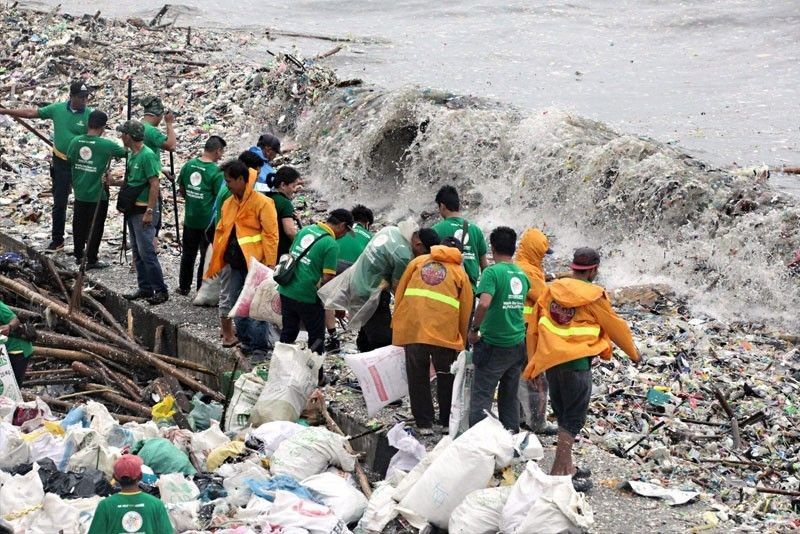Commentary: Evidence-based not reactive policies on waste management

Traditional linear models of production and waste management – make, use and dispose – do not work. It was this model that got us in this heaping problem of plastic waste pollution in the first place.
As governments and companies alike go to new depths in searching for solutions and alternatives, the policy discourse in the Philippines has instead simply focused on plastic bans and more taxes.
The Philippines has more than 30 local plastic reduction policies nationwide, according to a UN report in 2018. This characterizes our country as one of those having the greatest number of bans and regulations on plastic and styrofoam in the world, yet land-based ocean pollution still persists.
What difference will a nationwide ban do if the quality of our waste management systems stays the same?
Plastic reduction is an important component in a circular waste economy. However, not using plastics completely might not make more environmental and economic sense contrary to what everyone thinks.
Conversely, what we don’t usually hear is that the shift to alternative packaging increases environmental costs five times higher than plastic packaging.
As more raw materials are needed to replace plastic functions, this effectively means more greenhouse gas emissions, increased water depletion and ocean pollution. This likely translates to higher production costs from new production processes which may be passed on to consumers.
As unpopular as it may sound, the way forward is not to eliminate plastic but to invest more in sustainable plastic. Efficient packaging design, manufacturing technologies, improvement in recycling rate and energy recovery, and transport fuel efficiency are key considerations.
The Stratbase Pilipinas Conference held participated by a rare gathering leaders from the government, private sector, academe and civil society gave enlightening insights on the complexity of the issues and the need for innovative solutions.
Exemplars could be seen in the practice and efforts of the private sector. Winn Everhart, the President and General Manager of Coca-Cola Philippines, commits his company to help address the waste problem.
Through its “World Without Waste” program, Coca-Cola will collect and recycle all bottles or cans it produces. Innovations and accompanying programs with regard to design (packaging), collection, partnering are ongoing as well.
By 2030, the global packaging of the company will be made of 50% sustainable materials.
Today, Viva water bottles are made of 100% recycled PET (fully circular), while clear PET Sprite bottles are recyclable (100% recycled).
In January next year, the P1 billion PET bottle recycling facility will already be operational to substantially help reduce the waste leakage in the Mega-Manila area.
This first ever recycling facility in Southeast Asia is a realization of circular economy—make → use → dispose → collect → recycle → make. Further, this “full circle collection and recycling program” are currently being implemented in 13 provinces.
Meanwhile, another private action that showcases environmental concern is the Zero Waste to Nature by Unilever Philippines.
Its chairman, Benjie Yap explains that the “ambitious new commitments to collect and process more than it sells and halve use of virgin plastic” are anchored on a three-pronged framework: 1) less plastic using lighter, stronger and better materials which have lower environmental impact, 2) better Plastic to eliminate problematic/unnecessary plastics with recyclable materials and more recyclable content and 3) no Plastic by using materials and new packaging formats.
“Zero to waste nature” manifests a commitment to produce 100% reusable, recyclable and compostable packaging by 2025 and to invest in proving and sharing a technical solution to recycle sachets with the industry.
Other sustainable strategies were also discussed and explained from the public utilities sector.
According to Maynilad President and CEO Ramoncito Fernandez, polluted waterways leading to Manila Bay have been clogged primarily by human waste from open defecation, illegal discharges and commercial industrial establishments that directly drain untreated wastewater to the bay, or caused by poorly constructed/managed septic tank systems coming from 89% of the total number of barangays in the metropolis.
Among the interventions they are implementing are: the planting of trees and mangroves covering the Ipol Laguna Lake and Malabon Watersheds, and the Coastal areas of Manila Bay (Plant for Life); the education program that inculcates the importance of water sanitation and environmental protection to children and parents (Daloy Dunong); the acclaimed Dumagat Tribe program called “Sining Ipo;” and the program that saw the replacement of 2,300 kilometers of old pipes and the repair of 360,000 leakages resulting to the recovery of 700 million liters over the last 12 years.
In this Non-Revenue Water program, Maynilad spent an estimated P40.7 billion.
The trend of sustainability is further observed across various sectors. Sustainability models can be adapted and replicated with other LGUs. They create opportunities for public-private partnerships, green jobs and livelihood for communities not just in waste management but in other industries as well.
Imagine what these plastic packaging complexities can do in the context of the Department of Environment and Natural Resources’ ongoing Manila Bay clean-up and rehabilitation project and our waterways that have been choked indiscriminately with plastic litter.
Stratbase Group Managing Director and CEO, Prof. Dindo Manhit rightly stated that, “The task to protect and preserve the environment is not just the government’s business, it’s everybody’s business.”
What we need is a comprehensive and broad-based approach that is reflective of evidence-based and NOT reactive policies centered on plastic bans, taxes and more landfills.
The challenge we are living with requires going beyond traditional solutions: studying available technologies, aligning with best practices, and driving research and innovation in waste management.
There are those that have gone outside the box to address plastic waste pollution, and it is about time we do the same.
Vanessa Pepino is a non-resident fellow at think tank Stratbase ADR Institute.
- Latest
























